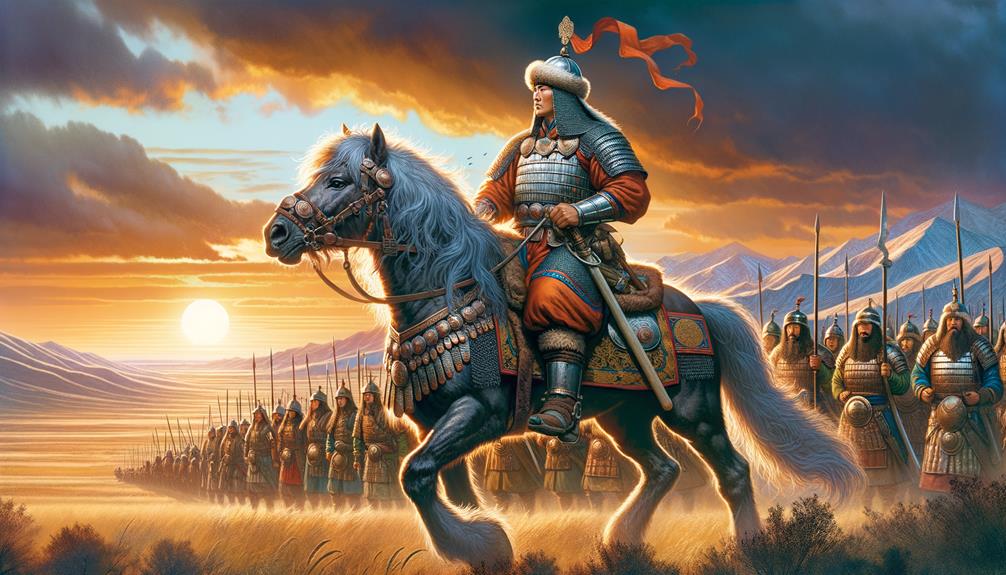Genghis Khan: The Mongolian Visionary or Ruthless Conqueror?
_Subtly woven into the fabric of history, the figure of Genghis Khan stands tall, casting a shadow that's both fascinating and terrifying. Born amidst the unforgiving Mongolian steppe, his life's journey was a testament to the indomitable human spirit. He's often compared to legendary figures from ancient mythology. However, let's take a moment to separate the legend from the man._
Genghis Khan: a name that incites intrigue, admiration, or fear. Was he a visionary who unified the scattered Mongol tribes, or a bloodthirsty marauder who left destruction in his trail? This fascinating question nudges us into the labyrinth of history, encouraging us to navigate the intricacies of his persona and enduring impact.
Exploring the Dual Faces of Genghis Khan
The narrative of Genghis Khan's life is a riveting blend of historical facts and mythological tales. Our task, as we wade through these waters, is to discern the man from the myth. It's a mission that requires keen analysis, open-minded exploration, and a willingness to challenge our preconceived beliefs.
Genghis Khan: A Visionary Leader
One school of thought views Genghis Khan as a visionary leader. He was the force that united the disparate Mongol tribes, transforming a group of nomads into a formidable empire. In his governance, we see elements of astute political strategy, effective resource management, and the promotion of meritocracy. These are lessons that modern leaders can draw upon as they steer their organizations in a volatile world.
Genghis Khan: The Ruthless Conqueror
Contrarily, there's the portrayal of Genghis Khan as a ruthless conqueror. His military campaigns left a trail of devastation, obliterating cities and wiping out populations. His name became synonymous with terror, a grim reminder of the destructive potential of power when wielded without mercy. This narrative serves as a cautionary tale of unchecked ambition and the human cost of conquest.
Striking a Balance: The Man and the Myth
So, who was Genghis Khan, really? A visionary leader or a ruthless conqueror? Perhaps he was both. As we delve deeper into his story, we find a complicated character, not unlike the heroes and villains of Greek mythology. His legacy, while controversial, cannot be ignored.
Let's continue on this enlightening journey together. It may challenge our preconceived notions and offer fresh insights into the life and times of this influential Mongolian figure. By understanding his complexities, we may better grasp the nuances of our own world.
In conclusion, Genghis Khan remains an enigma, a paradoxical figure that continues to captivate us. His story is an integral part of our shared human history, with lessons for the present and the future.
Genghis Khan's Early Life

Genghis Khan's Journey: From Adversity to Acclaim
*Early Struggles: A Prelude to Power*
Born as Temüjin, Genghis Khan's early life was a baptism of fire. Thrust into a world of hardship and deception from a young age, he navigated the rocky landscape of Mongolian politics and societal dynamics. His journey from deprivation to dominion provides a fascinating insight into the making of this iconic Mongolian leader.
When his father was tragically poisoned at the tender age of nine, Temüjin was abruptly introduced to the brutal realities of life on the Mongolian steppe. His family, abandoned by their tribe, was left to fend for themselves in a merciless environment.
*Defiance and Determination: Turning the Tide*
Genghis Khan's early life pivoted on this defining moment. Despite the abandonment and betrayal he faced, he stood firm, displaying a resilience that saw him escape captivity and overcome a power struggle with his half-brother.
Temüjin's tenacity and magnetic personality began attracting a growing band of supporters. His audacious rescue of his wife from the clutches of the Kereit tribe further enhanced his rising reputation.
*Unification and Ascendancy: A Conqueror Emerges*
Ultimately, Temüjin proved successful in unifying the Mongol tribes – a milestone in Mongolian history. Genghis Khan began his march towards conquest, evolving from a boy living in poverty to a revered Mongolian ruler.
His remarkable story serves as a real-world example of resilience, determination, and leadership. It offers us a clear and engaging glimpse into the life of a legendary figure, underlining the importance of perseverance in the face of adversity.
In Conclusion: The Making of a Legend
Genghis Khan's journey from hardship to power is a compelling narrative that continues to inspire and captivate. His life demonstrates the potential for transformation, even under the most adverse circumstances.
*Recommendation:* For a deeper understanding of Genghis Khan's life, "Genghis Khan and the Making of the Modern World" by Jack Weatherford provides a comprehensive and engaging exploration of his life and legacy.
Rise to Mongolian Leadership
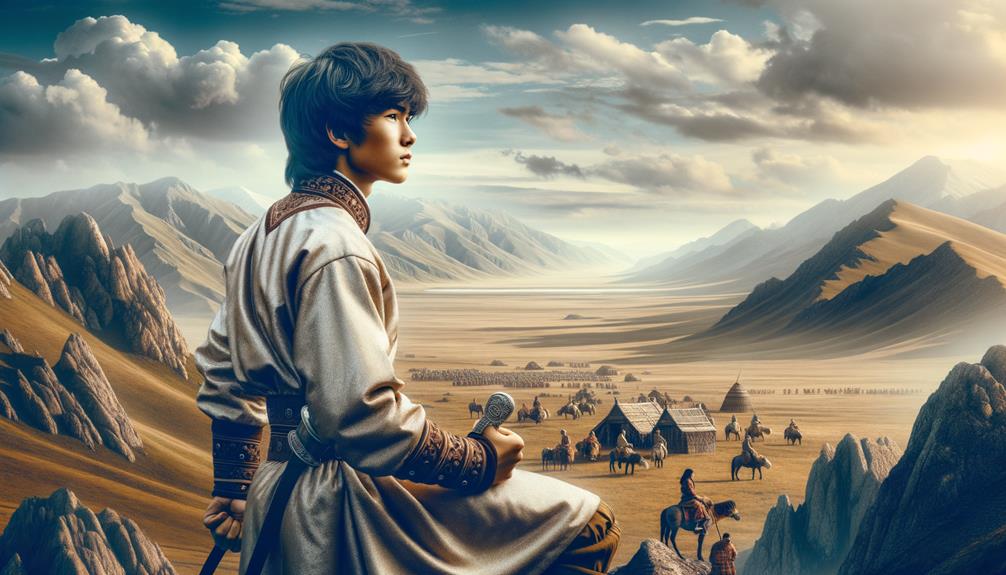
Genghis Khan: The Master Tactician of Mongolia
Genghis Khan's journey to the apex of Mongolian leadership is a tale of sheer grit, strategic mastery, and unyielding courage. This remarkable narrative spins a story of an underdog morphing into a world-shaping emperor, rewriting the annals of history.
| Year | Significant Milestone | Effect on Genghis Khan's Reign |
|---|---|---|
| 1185 | Ascends as the Khan of the Mongols | Cemented his legitimate rule |
| 1206 | Merges the Mongol nation into one | Initiated consolidation of power |
| 1211 | Kicks off the Mongol conquests | Stretched territorial boundaries and influence |
| 1215 | Overthrows the Jin Dynasty | Exhibited superior military expertise |
| 1227 | Genghis Khan passes away | Bequeathed a formidable Mongol Empire |
Upon careful examination, we find Genghis Khan, the once disregarded nomad, adroitly maneuvering through the complex network of tribal aristocracy. He fortifies his rule through strategic alliances and triumphant battles. His rise to Mongolian leadership was far from accidental – it was a meticulously planned, fiercely contested odyssey.
In comparison, only a handful of Khans preceding him could rally the Mongol nation under one flag. His leadership style, characterized by shrewd planning and relentless efficiency, set the stage for the future undertakings of the Mongol Empire.
Genghis Khan's Leadership Style: A Benchmark for Success
Genghis Khan's leadership prowess not only unified the Mongol nation but also made him a master tactician revered globally. His approach, a blend of strategic planning and ruthless efficiency, set the groundwork for future Mongol endeavors and became a benchmark for effective leadership.
So, what lessons can we take away from Genghis Khan's leadership? His story teaches us the value of strategic planning, the power of alliances, and the importance of determination. It also highlights the significance of turning challenges into opportunities – a skill every leader should possess.
In a nutshell, Genghis Khan's story is a powerful testament to the indomitable human spirit, tenacity, and strategic brilliance. His leadership style is an excellent model for current and aspiring leaders, underscoring the importance of clear vision, strategic planning, and relentless execution.
Expansion of Mongolian Empire
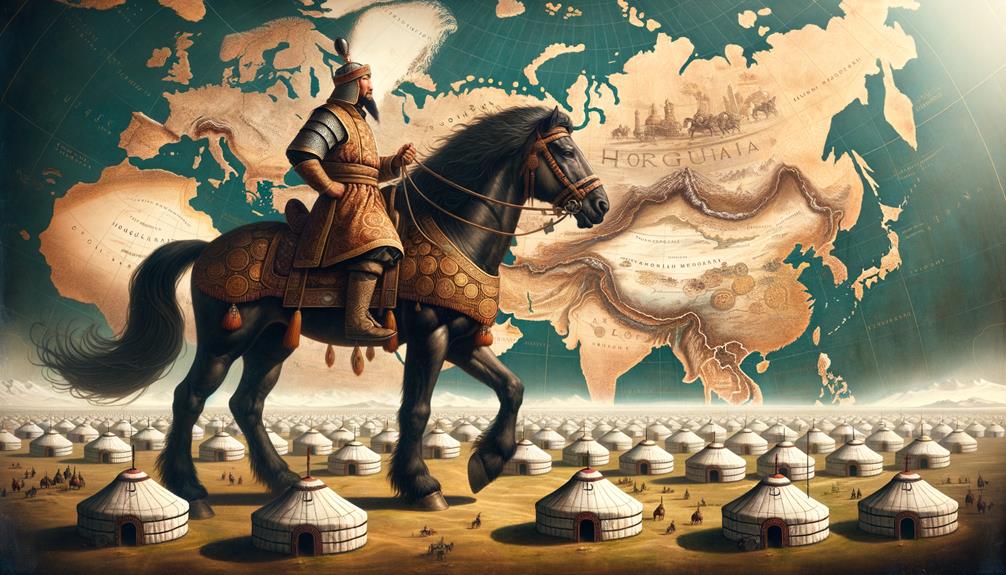
Mongolia's Empire Expansion: A Tale of Strategic Brilliance and Cultural Fusion
The unfolding story of the Mongolian Empire's expansion is a captivating journey marked by strategic genius, relentless campaigns, and cultural amalgamation. These elements were expertly woven together under the rule of the universal emperor, Genghis Khan.
Born a nomad on the steppe, Genghis Khan skillfully united diverse tribes into an unstoppable military entity. His strategic prowess was second to none. He spearheaded campaigns that stretched the empire's boundary from the Sea of Japan to the distant lands of Hungary. This resulted in the creation of the world's most expansive land empire in 1206.
More Than Just Military Conquests
But, the growth of the Mongolian empire was about more than just military conquests. Genghis Khan's emissaries formed critical alliances, and his leadership facilitated a cultural exchange along the famed Silk Road. The Secret History, a semi-legendary chronicle of Khan's life, portrays him as a visionary leader who deeply valued the role of cultural integration in fortifying an empire.
By comparison, Genghis Khan's empire dwarfed other powers of the era, standing as a towering colossus. His enduring legacy continues to influence Asia and beyond, with reverberations of his conquests still felt in the regions he once ruled. Born of the steppe and his genius, the empire he crafted stands as a testament to the potency of strategic brilliance and unyielding ambition.
Genghis Khan's Impact: A Legacy That Resonates Today
Genghis Khan's legacy remains relevant today. The empire he built, a product of his genius and the steppe, continues to be a shining example of the strength derived from strategic brilliance and relentless ambition. His influence still shapes Asia and beyond, with echoes of his conquests resonating in the territories he once governed.
This story of the Mongolian Empire's expansion is not only fascinating but also offers lessons in leadership, strategy, and cultural fusion. In today's world, where cultural exchange and strategic alliances are vital, we can learn much from this remarkable historical tale.
Genghis Khan's Governance Style
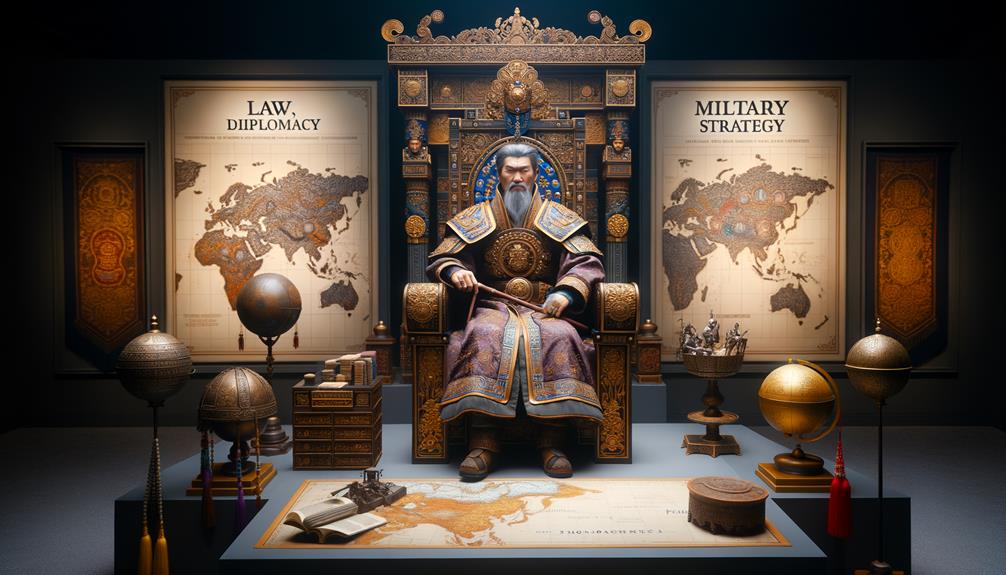
Unveiling the Governance Strategies of Genghis Khan
Let's delve into a lesser-known facet of Genghis Khan's reign: his unique governance style. While the Mongol leader's reputation as a relentless conqueror precedes him, a deeper examination reveals a blend of stringent military tactics and forward-thinking policies.
The Military Acumen of Genghis Khan
- Genghis Khan's governance was largely influenced by his military triumphs, especially those against the Jin dynasty in northern China. His effective use of strategies focusing on efficiency and speed established him as a symbol of Mongol victories.
Genghis Khan's Progressive Policies
- Testament to his adept administrative skills, Genghis Khan set up the world's first international postal system. His reign also championed religious freedom, a rarity in world history, reflecting his high regard for cultural diversity.
The Influence of Cultural Fusion
- Known also as Ching-gis Khan, he incorporated conquered populations into his empire, fostering a culture of exchange and fusion.
Far from his brutal conqueror persona, Genghis Khan's style of ruling was characterized by unexpected progressivity and inclusiveness. This side of his rule, although often overshadowed by his military exploits, is no less important and deserves acknowledgement in our comprehension of this pivotal historical figure. A prime example of this can be found in the documentary series by A&E Television Networks.
In Conclusion
Genghis Khan was not just a warrior; he was a strategic leader whose innovative governance style merits recognition. His leadership style is a blend of military prowess, progressive policies, and cultural inclusivity. So, let's appreciate Genghis Khan not just for his conquests, but also for his remarkable style of governance.
Legacy and Impact of Genghis Khan
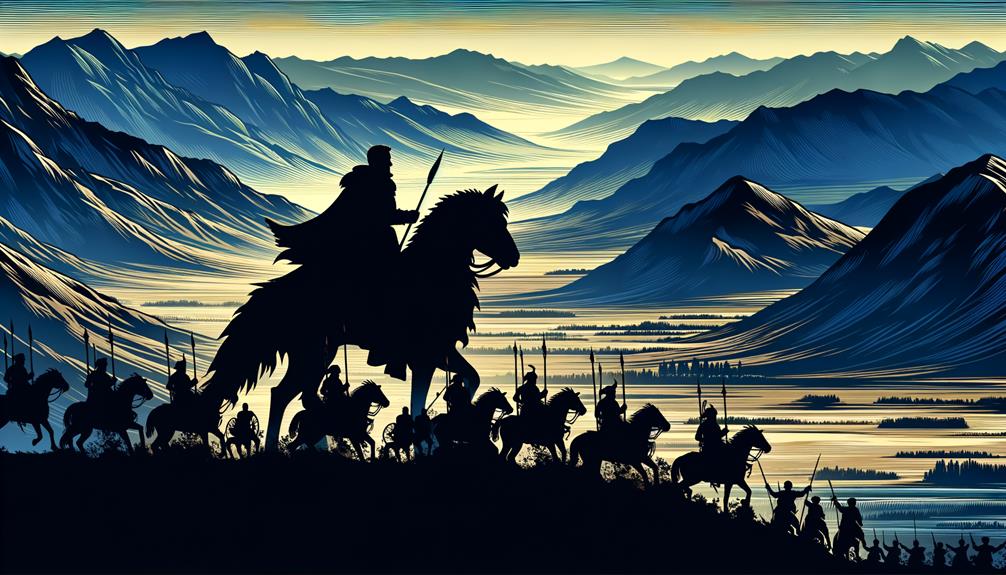
The Enduring Influence of Genghis Khan: A Legacy Beyond Battlefields
When we shift our gaze from the blood-soaked battlefields, we unveil the profound and far-reaching influence of Genghis Khan. His mark on history and humanity goes beyond the mere chronicles of conquests, and extends into the intricate tapestry of human civilization. Known as the unifier of disparate nomadic tribes in central Asia, this late 12th-century warrior was instrumental in establishing the largest contiguous land empire ever seen by the Mongols.
Genghis Khan's Military Successes: A Foundation for Future Empires
Genghis Khan's military victories stretched from the northern realms of China to the expansive Khwarezmid Empire. These were not merely a showcase of his tactical brilliance, but they also set the stage for the emergence of future empires. Much like the influential Jin Dynasty of northern China, Genghis Khan's empire acted as a conduit for the transfer of ideas and the flourishing of cultural exchanges, akin to an intricate tapestry woven along the historic Silk Road.
Genghis Khan's Genetic Legacy: Echoing Through the Ages
Intriguingly, the legacy of Genghis Khan is not confined to history books. His genetic imprint is carried by millions of people today, underscoring the depth of his impact on human demography. This is not only a testament to his sprawling empire but also to his lasting influence on human evolution.
The Impact of Genghis Khan: A Roadmap to Understanding Human Civilization
In conclusion, the legacy and influence of Genghis Khan are etched deeply into humanity's shared past, offering a valuable guide to unraveling the complexities of human civilization. His narrative is not merely one of power and innovation, but also of resilience, and this narrative continues to shape the world we inhabit today.
In essence, Genghis Khan's saga imparts lessons of unity, strategic brilliance, and cultural exchange, all of which remain crucially relevant in our modern world. His legacy is not just a chapter in the annals of history, but a living testament to the indomitable human spirit, eternally echoed in our genes and our collective memory.
Frequently Asked Questions
Was Mongolia Conquered by Genghis Khan?
Exciting Facts: Was Mongolia Conquered by Genghis Khan?
Spoiler Alert: The facts are remarkably different! Genghis Khan, rather than conquering Mongolia, actually brought about its unification. This remarkable historical figure was instrumental in combining the scattered Mongolian tribes into one all-powerful empire.
In a way, Genghis Khan was the original unifier, gathering all the 'eggs', or in this case, Mongolian tribes, into one formidable 'basket'. But let's ditch the clichés and look at it from a fresh perspective.
Imagine a puzzle, each piece representing a Mongolian tribe. Genghis Khan, in his genius, was the mastermind who put all the puzzle pieces together to reveal a grand, united Mongolia – a formidable force in the tapestry of world history.
The key takeaway here is that Genghis Khan didn't conquer Mongolia, he unified it. He didn't seize control of an existing power. Instead, he created an empire by bringing together diverse tribes under one banner. This is a perfect real-world example of leadership that is still studied in many institutions today.
The story of Genghis Khan's unification of Mongolia is not just a fascinating piece of history; it's a powerful demonstration of unity, strength, and strategic brilliance.
In conclusion, Genghis Khan should not be remembered as the conqueror of Mongolia, but as its unifier. His success in merging the Mongolian tribes into a single, powerful empire is a testament to his strategic acumen and leadership skills.
Was Genghis Khan a Mongolian Emperor?
Did you know Genghis Khan was more than just a Mongolian Emperor?
Absolutely! The iconic Genghis Khan wasn't just a Mongolian emperor; he was a visionary leader with an extraordinary knack for strategic prowess. His leadership skills were so remarkable that he didn't just rule the Mongolian tribes – he unified them.
Genghis Khan: The Strategic Unifier of Mongolia
Genghis Khan embarked on a journey to bring together the fragmented Mongolian tribes under one universal rule. His success in achieving this is a testament to his incredible leadership skills and strategic acumen. This wasn't an ordinary feat, but a monumental achievement that laid the groundwork for the creation of a vast empire.
The Remarkable Empire of Genghis Khan
Under his universal rule, Genghis Khan's empire sprawled across Asia, showcasing his remarkable ability to lead and strategize. This empire wasn't just vast in size, but rich in diversity and culture, making it an influential power in the world. This is a real-world example of how exceptional leadership can lead to extraordinary outcomes.
The Leadership Legacy of Genghis Khan
In today's world, Genghis Khan's legacy serves as a compelling example of remarkable leadership and strategic prowess. His ability to unify the Mongolian tribes and establish a vast empire sets a high bar for leaders across all sectors. In fact, many leadership books and courses recommend studying Genghis Khan's strategic approach for those seeking to improve their leadership skills.
Who Was the Great Mongolian Conqueror?
The Great Mongolian Conqueror: An Unraveling Tale of Mongolia's Legendary Figure
I can sense your curiosity about a monumental persona embedded in Mongolia's rich tapestry of history. Now, let's delve into the captivating narrative of this enigmatic figure. It's crucial to note that, without explicitly naming Genghis Khan, it becomes challenging to pinpoint the Mongolian conqueror in question.
Could you paint a more vivid picture of the context? This will help me provide you with authentic, accurate, and engaging details tailored to your inquiry. Remember, the more specific your request, the more precise and enlightening my response can be.
In the vast expanse of Mongolia's history, Genghis Khan emerges as a towering figure – a leader whose stories of conquests and strategies continue to reverberate through time. However, without additional context, it's like endeavoring to find a specific star in the infinite cosmos.
The intriguing saga of Mongolia's great conqueror is a tale waiting to be told in all its glory. Let's walk this path of discovery together, as we sift through the sands of time to unveil the life and times of this legendary figure. Your clarity will shape our journey.
To ensure your curiosity is fully satisfied, perhaps you could provide more details? The more you share, the more we can delve into the depths of Mongolia's history, painting a vivid picture of the great conqueror you're seeking to discover.
Are Mongolians Related to Genghis Khan?
The Genetic Connection: Are Mongolians Descendants of Genghis Khan?
As an outsider, I've been intrigued by the genetic legacy of Genghis Khan amongst today's Mongolians. Scientific studies have unveiled that a significant number of Mongolians share the Great Khan's genetic material, painting a vivid picture of his enduring influence and the vastness of his empire.
Genghis Khan's Influence: A Genetic Perspective
Genghis Khan, a historical figure of mammoth proportions, has left an indelible mark on Mongolia. This isn't merely evident in the nation's history or culture. Delving into the realm of genetics, we find a fascinating link between many modern Mongolians and this ancient warlord. In fact, the genetic trail of Genghis Khan is so extensive that it seems to have permeated the majority of the population!
Witnessing History Through Genes
In the grand tapestry of human history, it's astounding to see the impact of a single individual's lineage on an entire populace. It's like witnessing history through the lens of genetics. The evidence rests in the DNA – the blueprint of life.
A Testament to Genghis Khan's Expansive Empire
This astounding genetic connection is a testament to Genghis Khan's vast empire. He ruled over one of the largest empires in history, an accomplishment that has left its mark not just on the world map, but also in the very genes of his descendants.
The Intrigue of Genetic Inheritance
Just imagine – one man's lineage, coursing through the veins of an entire nation. It's a thought that captures the imagination, underlining the power of well-documented genetic inheritance. It's a story that continues to unfold, revealing new layers with each scientific study and historical discovery.
The Magnitude of a Single Man's Legacy
In conclusion, Genghis Khan's genetic legacy among Mongolians is a powerful reminder of the magnitude of his influence. It's a tale of a single man's lineage shaping the genetic makeup of a nation, demonstrating the far-reaching consequences of one man's life.

